Searching for the ontology of the word “curriculum” leads to a conceptual labyrinth. One corridor leads to the “official curriculum,” a pretzelized salty maze in itself embedded in this labyrinth. Another leads to an “activity curriculum,” a field of flowers in which a magic village thrives. A third corridor dead ends at the “hidden curriculum,” a smoky place riddled with thick roots of ancient trees to trip up the unwary, where lessons in humiliation are camouflaged objectives. A fourth leads to a golden door through which principals, parents, politicians, and philanthropists may not pass: the “lived curriculum.”
One of three core courses in my doc program—core in that every doc student regardless of special emphasis was required to take it—was titled “Concepts of the Curriculum.” The course itself was, of course, part of the “official” curriculum, taught as a seminar in the “activity curriculum” (activity in this seminar meant reading, writing, and discussing the official curriculum and its implications for research).
There was a “hidden curriculum,” an iceberg under warming waters. We fathomed that we took this course not to study history, the surface of the course, but to sensitize us to the spinning blades of the combine which the official curriculum is for the powerful who authorize truth and knowledge (a salute to Foucault).
*
In my Secondary Reading Course for single subject credential candidates, a word I emphasized across the “curriculum” of the course aka the “living curriculum” was “coverage.” Every teacher-in-training was required to be steeped in authorized subject matter (aka “knowledge”) to be “covered” in their undergraduate major courses in order to equip them to “cover” the material (“knowledge”) in their teaching in high school. “King Coverage” wrote Vacca and Vacca in the textbook I used.
Interestingly, from the very first meeting to the final exam, the course set out to do essentially what “Concepts of the Curriculum” set out to do for doc students in my PhD program—to sensitize these teachers-to-be to the combine. “Coverage” of content in content-area courses like biology is necessary because the “official curriculum” is organized on two axes: Topics and Time. Never conflate coverage with learning. Because topics are infinite and class time is precious, adequate “coverage” in practice is a grand compromise.
So many topics. So little time.
*
These words are taken from a recent EdWeek article narrating a new wrinkle in the Science of Reading ©️ saga. As you know, SoR ©️ birthed itself in its current form in 2017. Emily Hansford announced to families throughout the land that they had been “sold a story.” Parents were called to take up arms against schools and teachers, who have faked reading instruction all these years. Long story short: Go forth, teachers, sayeth the parents, phonicate, and prosper.
Are subjects ever “typically cordoned off” from other subjects even when they are taught in separate periods with different teachers? Are subjects ever isolated from other subjects, restricted from onlookers, protected from contamination? Who among us as educators thinks of subjects as “cordoned off” unless we succumb to the “official curriculum?”
More importantly, is it intellectually honest to conceive of a teacher’s work with learners as “cordoned off?” The ontology of the “lived curriculum” is inherently integrated because students don’t hole up in period one, dissolve during the transition, then reconstitute themselves in period two. The teleological frame of the official curriculum isolates itself from the ontology of schools, officially rendering the authorities who hold power to name truth and knowledge deaf, dumb, and blind to reality unless we accept that standardized test scores portray reality.
Very curious language. Researchers argue? How about teachers? How about kids? Who except for those with experience teaching in the elementary grades can speak to the collective guilt arising from an understanding of the significance of science in a context of inadequate resources, facilities, and on-site expert knowledge? What may be a well-worn cliche is a central fact of life for many teachers.
*
The Knowledge Matters campaign, which I’ve discussed previously in this newsletter, is gaining traction. The evidence? EdWeek is writing about it, uneasy, uncomfortable. The SoR ©️ ideology which has found sympathetic ears in EdWeek “coverage” asserts itself squarely as an arm of the official curriculum where Coverage: Topic and Time demands the attention of legislators. Advocates of phonics fast and furious see no other topics worthy of the time of day.
The dog caught the car. SoR ©️ is reified in laws in virtually every state. Now, however, Knowledge Matters has complexified Emily Hansford’s prescription. Wait a minute. Should teachers spend so much TIME on NONSENSE words? Should the official curriculum privilege syllables over science? How else will students be prepared to read about science from textbooks?
Citing NAEP data, EdWeek inadvertently undermines its own argument over the past few years where it willingly set “balanced instruction” against “systematic phonics,” fabricating a partisan model of teaching. It’s become almost an article of faith among the SoR ©️ congregation that balance, whatever that means to them, is a tangible enemy. The implications from EdWeek highlighting the shameful place science now occupies in the elementary school curriculum hinges on far more than TIME and TOPIC. Elementary schools need facilities—labs, for example, microscopes, greenhouses—“coverage” means more than TOPIC.
It’s too much to hope that EdWeek could publish an article pushing back on the foundational usurpation of the “lived curriculum” by the “official curriculum.” To do so would require “scientific evidence,” of course. Since when has the official curriculum required scientific evidence? Moreover, when are teachers brought into curriculum discussions? Much hoopla surrounds asking them their opinions of curriculum materials.
Putting science “on par” with other subjects is a fake solution. Turf wars in schools are never the answer, though they proliferate in a system starved for resources. The approach fails to move the ball down the field because it promotes “coverage.” 60 minutes of textbook science? What about literacy, history, and mathematics in science? What about observations, experiments, simulations, tools, techniques, technology? The parenthetical says it all. Do we really need research to tell us the “optimal time dosage for different subjects and skills that children need to learn?” Optimal time dosage—how long is the half-life of radioactive terms like time on task?
Knowledge Matters is nuanced, a movement grounded not in anecdotes and stories as the monolithic SoR ©️campaign is. My sense is that the campaign is a Trojan horse. Vocabulary and comprehension are two of the five pillars in most of the legislation, grandfathered in under the terms of lip service. So even if reading is fundamental, reading must be about “something,” argue the forces of Knowledge, there are vocabulary items, and those items invite thinking in concepts. Youngsters think best about concepts in situated contexts. Knowledge derives not just from books and lectures, but from experiences, Knowledge warriors assert. Dosages of time harken back to the banking concept of education of the sort embraced by SoR ©️ leading back to the official curriculum.
Those knowledge campaigners emerging from the belly of the horse inside the citadel of Policy have a different, more basic struggle looming. Subjects must be liberated from “cordoned off” spaces in the official curriculum where learners become reduced to records in a cumulative folder. Subjects are living inside the minds of learners who show up whole all day long with brains that are, to use a well-worn cliche, pattern-seeking devices. “Cordoning off” subjects with research-based time dosages works for bureaucrats, businessmen, and legislators, but its results for the great unwashed masses, one of whom is me, have not been impressive.
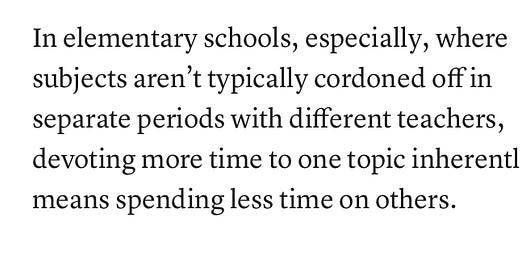


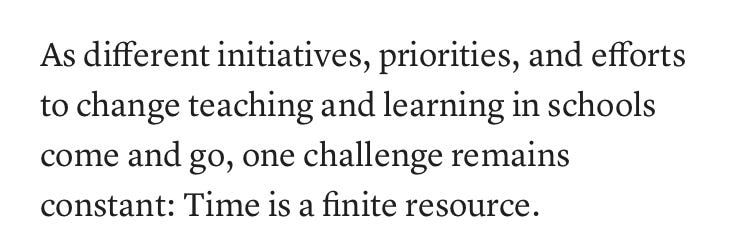

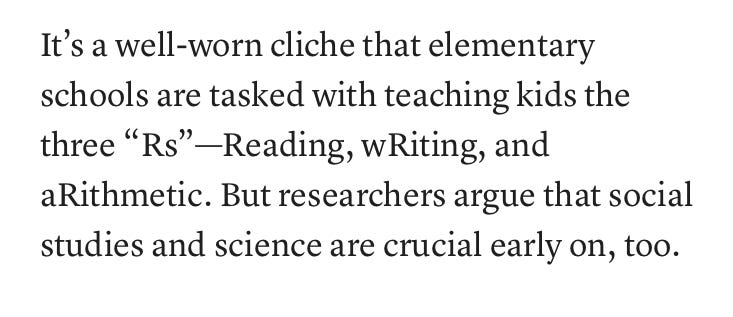
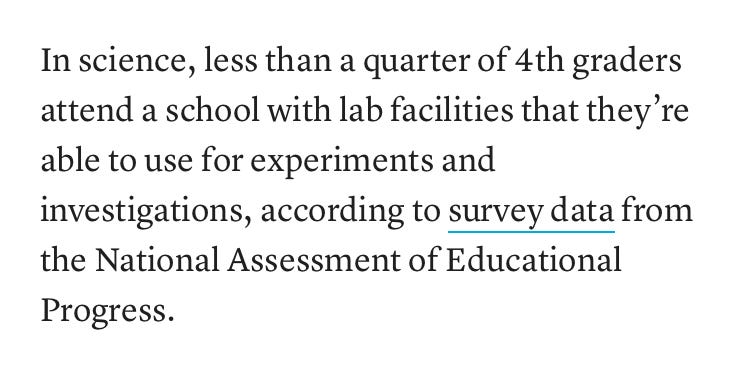
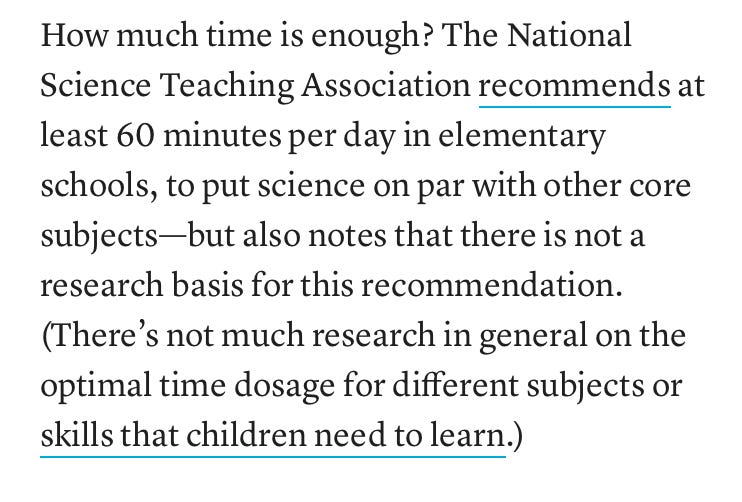

Every time "science" is evoked in discourse, you have to start digging, am I right?
I appreciate your deep reading here. The social sciences seem to always want to dissolve the "social" designation and convert into a "hard" science.